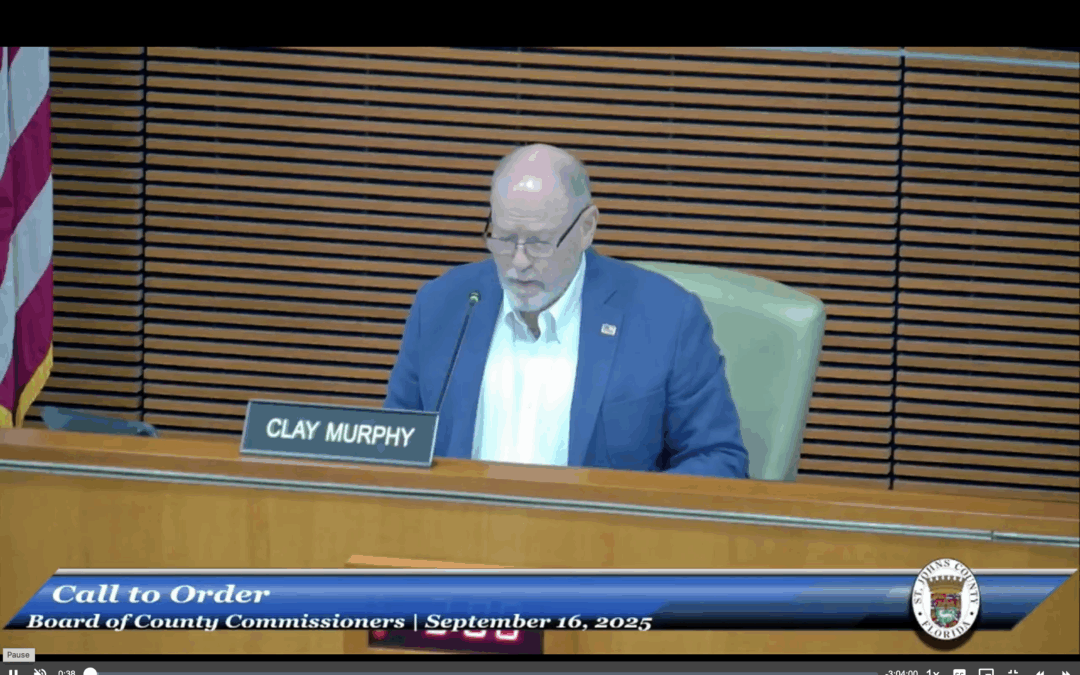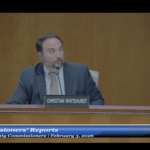The St. Johns County Board of County Commissioners approved significant increases to development impact fees during their September 16, 2025, meeting while also addressing growing concerns about political violence following the recent assassination of Charlie Kirk.
The meeting began with Commissioner Ann Taylor reading a Constitution Week proclamation recognizing September 17-23, 2025, as Constitution Week. Beth Pulse from the Daughters of the American Revolution accepted the proclamation, noting that “they locked those men in a poorly ventilated room in Philadelphia for 30 days, and there were actual fistfights that broke out over some of the provisions in our Constitution.” She emphasized that despite divisions then and now, “the one thing that unites everybody here is that we all love our country, our state, and our county.”
Public Comments Address Community Concerns
During public participation, several residents raised concerns about ongoing issues. Sherry Badger presented photos showing drainage problems on South Collins Avenue, stating “this is why I’ve been here for over eight years” and describing how county modifications to ditches have caused flooding on her property.
Multiple speakers addressed the recent assassination of Charlie Kirk and called for reduced political tensions. One speaker emphasized the importance of kindness, saying, “In today’s climate, when you can be anything, be kind. It takes nothing for a kind word to come out of your mouth.”
Impact Fees See Substantial Changes
The most significant discussion centered on updating the county’s impact fee schedule. Michael Robinson, Director of Management Services, presented four main areas requiring board direction: implementation of a new conservation impact fee, overall fee levels, affordable housing discounts, and elimination of commercial buydowns.
For the new conservation impact fee, commissioners debated whether to implement it at the maximum level supported by data analysis. Commissioner Murphy supported starting at 50% of the maximum, stating, “It’s a new fee, and I think a lot of people, this will be unanticipated, just allowing them to catch up, we can always raise it in the future.” Commissioner Taylor disagreed, arguing “land is expensive and my concern with lowering it is that it is not much at all, $1.5 million a year. We won’t be able to do much at all.”
The board ultimately reached consensus to implement the conservation fee at 50% of the maximum level, potentially generating approximately $1.5 million annually for land conservation and activation.
Regarding overall fee increases, the board faced a choice between a 50% increase requiring majority approval or higher “extraordinary circumstance” levels requiring supermajority approval. Commissioner Murphy argued against extraordinary circumstances, stating, “talking about food costs will go up, auto repairs will go up, healthcare costs will go through the roof if we vote to enact the extraordinary circumstance.” Commissioner Taylor acknowledged this as a compromise, saying, “It’s nowhere near where it should be. But it certainly is better than where we are at.”
The board reached consensus on the 50% increase level, which will be phased in over four years due to state requirements.
Affordable Housing and Commercial Buydowns
For affordable housing assistance, Commissioner Murphy proposed a 50% waiver of impact fees for housing under 80% of Area Median Income (AMI), stating this would help “all the workers who work here” and address traffic issues. Commissioner Taylor, who serves on the Affordable Housing Advisory Committee, noted “80% really is not nearly enough for so many people” but supported the proposal.
The board eliminated the existing commercial buydown program that had subsidized 40% of non-residential impact fees since 2018, costing approximately $14 million in general fund transfers. Commissioner Taylor said, “I’ve heard that loud and clear. Our residents are looking at every tax dollar.”
Northeast Florida Builders Association Raises Concerns
Austin Nicholas from the Northeast Florida Builders Association delivered extensive testimony raising concerns about the impact fee increases. He argued that “St. Johns County will have future growth pay for existing problems that it did not cause, which is not permitted by state statute,” and noted that county housing starts are at their lowest level since 2015.
Nicholas presented data showing St. Johns County’s budget of $1.9 billion compared to Jacksonville’s $2 billion budget, despite Jacksonville having three times the population. However, Commissioner Murphy later clarified that when enterprise funds and carryovers are excluded, the county has discretion over approximately $400 million, not the full $1.9 billion.
Robinson Improvement Company Case Postponed
The board considered a Special Magistrate’s report regarding Robinson Improvement Company’s request to rezone 2,763 acres for development. The magistrate found the company had reasonable expectations for increased density but recommended several limitations to slow growth.
Commissioner Murphy expressed uncertainty about proceeding immediately, stating, “I don’t feel comfortable playing Russian roulette with tax dollars when we can still be seeking more information.” Commissioner Arnold agreed, citing the need for input from a newly formed agricultural committee. The board postponed the decision by a 3-1 vote, with Commissioner Whitehurst voting against the postponement.
World Golf Hall of Fame Redevelopment Advances
Two proposals for redeveloping the World Golf Hall of Fame property moved forward to Phase 2 of the selection process. The first proposal from Capital Group of Florida and Alchemy Attractions focuses on golf recreation, food service, and entertainment facilities. The second from Cross Regions Real Estate proposes medical treatment facilities, independent living, retail, and restaurants.
Doug Smith from Cross Regions emphasized their track record, noting, “We have the Fountains at St. John’s, they are at 210 and 95. People don’t understand it’s a 100-acre development, still a lot coming.” The board unanimously approved advancing both proposals to the more detailed Phase 2 evaluation.
Infrastructure and Development Approvals
The board approved several routine items, including a six-month extension for a wastewater reuse line project to secure $1.8 million in remaining grant funding, a modification to St. Augustine Industrial Park’s development schedule, and rezoning for a RaceTrac gas station on US Highway 1.
Commissioner Murphy noted the RaceTrac project’s environmental protections, saying, “Thank you for your commitment to protecting our specimen trees. I know it’s very important. Also, the wetlands.”
Vermont Heights Septic System Issues
In a quasi-judicial hearing, the board approved vacating a portion of Vermont Boulevard right-of-way to allow residents Marvin Sartain and his neighbor to relocate failing septic systems. Sartain explained that flooding from an adjacent property has saturated his septic system, requiring relocation to higher ground.
Opponent Macquarie Bassett argued the right-of-way belongs to the public, stating, “St. Johns County has no authority to give away right of way to the property that they are not on.” However, County Attorney Ryan Ross confirmed the county had authority to vacate the unused right-of-way, and the board approved the request 4-0.
Political Violence Concerns Addressed
Commissioner Whitehurst delivered an extensive report on rising political violence, referencing recent assassinations, including Charlie Kirk’s death. He cited a study showing 38% of respondents said killing Donald Trump would be “somewhat justified,” with the percentage rising to 55% among left-leaning respondents.
“What has been more difficult for me to process than the killing of a man who was simply espousing his point of view was the hundreds, if not thousands, of celebratory social media posts,” Whitehurst said. He announced plans to regularly highlight concerning rhetoric in future meetings, stating, “The time for sweeping it under the rug and saying it’s a part of doing business, that time has come and gone.”
Commissioner Murphy echoed these concerns, declaring “I am Charlie Kirk” and emphasizing the victim’s message of “Christianity and love and acceptance.” He noted that Kirk “believed in love and inclusion, and believed in the truth.”
Night of Lights Task Force Proposed
Commissioner Taylor proposed creating a task force for the upcoming Night of Lights festival, citing the county’s recent $650,000 funding commitment to the event. “Time is so crucial. We cannot wait, we have got to act now,” Taylor said, noting they are approximately 70 days from the event.
The board expressed unanimous support for the concept, with County Attorney Ross indicating he would research the proper procedures for establishing such a task force involving multiple entities.
Budget and Technology Updates
The board approved the Community Redevelopment Agency’s fiscal year 2026 budget for three redevelopment areas and authorized a $16.7 million construction contract for Northeast Community Park’s early development phase.
They also approved a $393,400 contract amendment for Enterprise Resource Planning system implementation consulting services. Assistant County Administrator Sarah Taylor explained the system will “modernize our business infrastructure and create accurate, accessible, and productive records for county staff and the public.”
Commissioner Reports and Updates
Commissioner Arnold announced a celebration for Black History Museum funding allocation scheduled for Thursday at Collier Park and requested consensus to install baby changing stations at fire stations following recent state statute changes.
Commissioner Taylor reported on her community meeting with Sheriff Hardwick regarding iguana control funding and noted continued resident concerns about enforcement ordinances.
The meeting concluded with Commissioner Murphy providing American Legion Post 194 with 10-12 loads of asphalt milling for their parking lot improvement project, approved by a 4-0 vote.
Chair Commissioner Krista Joseph participated by phone due to personal matters, with Commissioner Murphy serving as acting chair. Joseph was repeatedly mentioned in prayers and well-wishes throughout the meeting, with commissioners asking the public to keep her in their thoughts during her absence.
The session demonstrated the complex balance commissioners face between promoting development, protecting residents’ interests, and addressing broader societal concerns while managing a county experiencing rapid growth and change.








